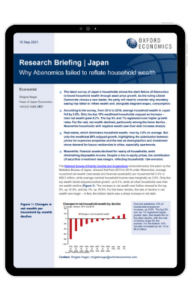Why Abenomics failed to reflate household wealth

The latest survey of Japan’s households shows the stark failure of Abenomics to boost household wealth through asset price growth. As the ruling Liberal Democrats choose a new leader, the party will need to consider why monetary easing has failed to reflate wealth and, alongside stagnant wages, consumption.
What you will learn:
- According to the survey, from 2014 to 2019, average household wealth in Japan fell by 3.5%. Only the top 10% wealthiest households enjoyed an increase – their net wealth grew 8.2%.
- Real estate, which dominates household wealth, rose by 3.5% on average. But only the wealthiest 20% enjoyed growth, highlighting the polarisation between prices for expensive properties and the rest as demographics and investment drove demand for luxury residencies in cities, especially apartments.
- Financial assets declined for nearly all households, amid diminishing disposable income.
Tags:
Related Services

Post
House prices continue to slide for China’s cities
Research Briefing Why Abenomics failed to reflate household wealth While the property market downturn has been universal, the scale and depth has been varied for different cities and regions.
Find Out More
Post
The Construction Productivity Challenge in Australia
Delve into the state of construction productivity in Australia. Understand the factors affecting growth and how innovation can transform the industry for the better.
Find Out More